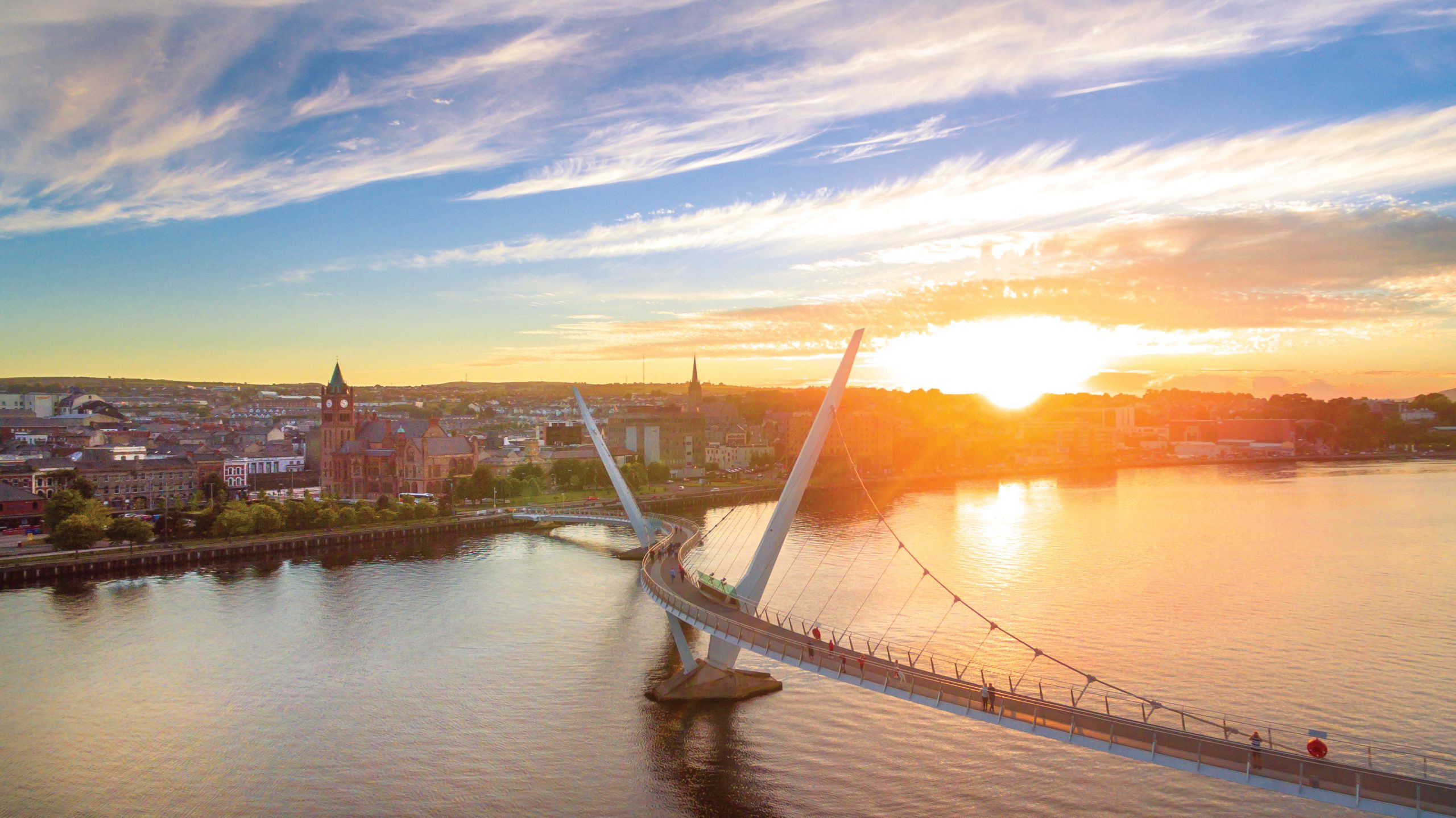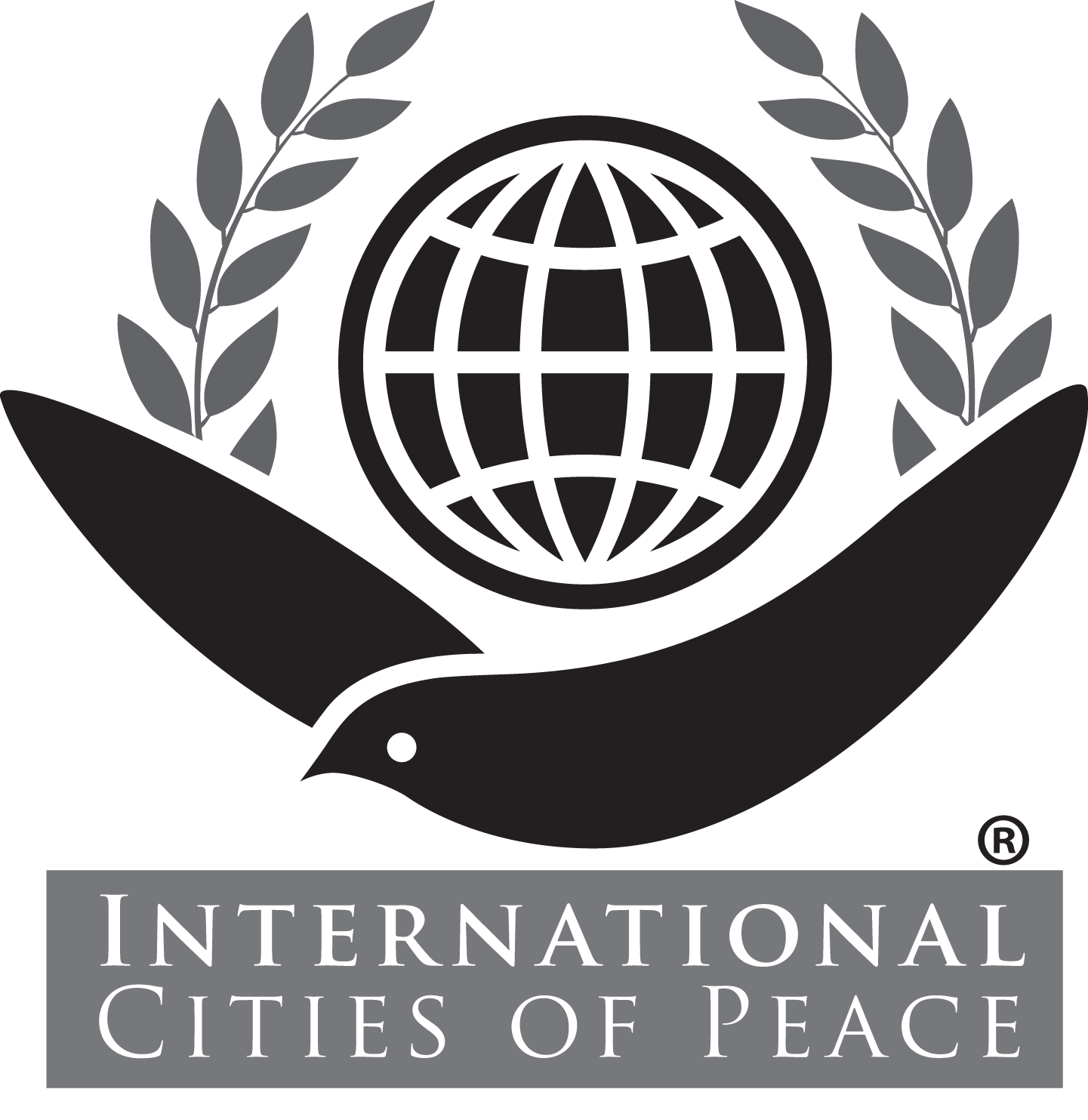DERRY CITY and STRABANE DISTRICT, NORTHERN IRELAND: INTERNATIONAL CITY OF PEACE
We welcome the citizens of Derry-Londonderry & Strabane District, in Northern Ireland, as they honour the legacy of peace-making and peacemakers in establishing their community as an International City of Peace. The association of International Cities of Peace celebrates their history as well as their present and future commitment to increasing the safety, prosperity and quality of life for all in their community.
Numerous people have contributed to putting in place their common vision of Derry City and Strabane District as an International City of Peace. We recognise the work of David Latimer, Minister Emeritus of First Derry Presbyterian Church, who has stepped forward as an official liaison between Derry-Londonderry and International Cities of Peace.
VISION STATEMENT
A thriving, prosperous and sustainable City & District with equality and opportunity for all
MISSION STATEMENT
We are ready to show, both to ourselves and the world, that a new life is progressively taking shape across our City and District where all are tirelessly working to identify common ground and work at all times in the interest of the common good.
GOALS
By choosing International Peace Day, to proudly and publicly announce our entry into the global family of International Cities of Peace, it is our desire, thereafter, to annually assemble at Derry-Londonderry’s Peace Flame to listen to the voice of the young and reaffirm our commitment to building the unshakable foundations for a culture of peace.
Aware that young people have a longing for harmony, not by holding down one segment of society but by upholding the rights of every human being regardless of what they look like or how they pray, opportunities must be identified for the young to periodically share their hopes for our City and District.
Derry City and Strabane District can yet become a garden where the young plant new seeds that will permit our City & District to be cleared of anger, fear and hatred and become a safe place for people of all faiths and no faiths. Making time and space available for the young to be way showers and light bearers will encourage others to flourish and grow.
Governments lay foundations and provide funding but it will be the young who take the dream forward and build the future. Becoming an International City of Peace is the right time for Derry City and Strabane District to consider finding ways to promote a broader inclusion of young people in the democratic decision-making process to inform and influence key social, economic, environmental and political agendas.
Derry, officially Londonderry but often called Derry-Londonderry, is the second largest city in Northern Ireland and the fourth largest on the island of Ireland.
Derry-Londonderry is sometimes referred to as the Maiden City by virtue of the fact that it’s walls were never breached, despite being besieged on three separate occasions. Regarded as the capital of the North-West Derry-Londonderry straddles the border with the Republic of Ireland.
Derry-Londonderry is a two-cathedral city, built on a hill on the west bank of the river Foyle, with a rich ecclesiastical past going back to Columba, a sixth century saint, important to both Catholics and Protestants. The old city is partially contained by well-preserved city walls 1.2 miles in circumference, completed in 1618. The Walled City is a special cultural and historic City quarter, featuring a range of period properties, museums and art venues.
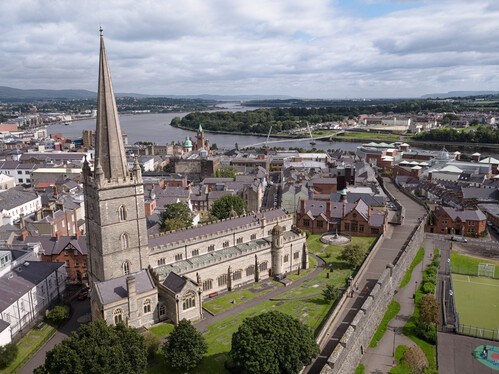
Growth of the modern city dates from the 1850’s, when linen shirt making became important. More recently the City & District has repositioned itself as one of the most creative and cultural areas on the island of Ireland having become a strong global competitor in tourism, life sciences, digital and creative industries.
In 2017 Derry City and Strabane District published an Inclusive Strategic Growth Plan called ‘Our Community Plan.’ Working collectively the objective is to harness and address the prevailing challenges that face the City and District to achieve an agreed vision of -: A thriving, prosperous and sustainable City and District with equality and opportunity for all.
In 1932 Derry-Londonderry gained global recognition for being near the place where Amelia Earhart landed her plane after flying solo across the Atlantic. Londonderry served as a strategic naval base during World Wars I and II.
Sadly, everything changed when The Troubles broke out. The habits and hearts, words and ways of both communities hardened as the political skies darkened across Derry-Londonderry and beyond.
Tensions between Catholics and Protestants had been simmering for some time. A Civil Rights campaign, seeking equal rights for Catholics, was inaugurated in Northern Ireland in 1968. On 12th August 1969 the annual Apprentice Boys march ended with clashes and street violence. There followed three days of rioting, known as the Battle of the Bogside, which ended when the British Army was sent in. A Civil Rights march on Sunday 30th January 1972 tragically ended with the death of fourteen people. Ever since, this sombre day in the long and varied narrative of Derry-Londonderry, has been referred to as Bloody Sunday.
Astonishingly, it would take thirty years for the idea of equal rights for all, rather than competing nationalisms, to re-emerge and fuel an embryonic peace process, that has progressively permitted former enemies to come together in a power sharing devolved administration at Stormont, the site of Northern Irelands Parliament Buildings. In the parlance of Vincent Van Gogh, “many people seem to think it foolish, even superstitious to believe the world could still change for the better… but then, in spite of us and without our permission, there comes an end to the bitter frosts. One morning the wind turns and there is a thaw. And so, I must still have hope!”
Sectarian violence has slowly given way to a situation that appears to be working. The inevitable outcome of ‘an eye for an eye leaving everybody blind’ has been rejected and replaced by a growing hope for peace and reconciliation nowhere better expressed than in a powerful piece of public-art at one end of Derry’s oldest bridge, showing two figures extending their hands to one another.
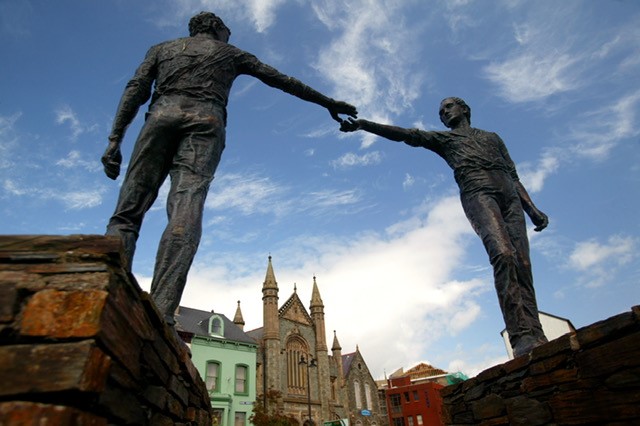
Hands Across the Divide
While, in the language of Mandela, “the long road is not ended,” it is nevertheless accurate to acknowledge how this formerly sharply divided city increasingly sees itself as a shared space for all. Evidence of this can be found in the Peace Bridge across the River Foyle
The Peace Bridge, built at a cost of £14million, was funded by the SEUPB (PEACE III) programme. It was opened in June 2011 to act as a catalyst for change; joining the city physically, promoting interaction and engagement among communities and bringing back into public use, for the first time in over 150 years, the former Ebrington military barracks creating new shared space and ultimately contributing to a new shared society.
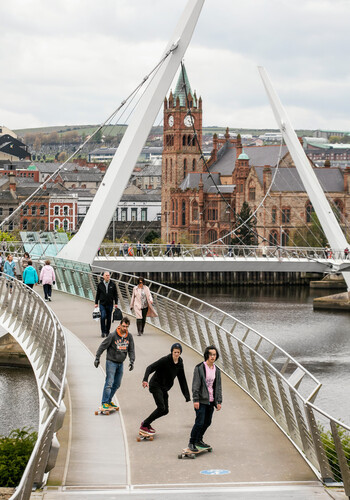
Further proof of the desire to bring about change can, moreover, be traced to the Maiden City Accord, an initiative developed by the local Loyal Orders in 2014 to promote a dignified, respectful parading culture. Significantly, this Accord flows from a spirit of generosity and serves to promote a culture of respect throughout the Maiden City. Furthermore, it is available as a template to assist other areas of Northern Ireland to resolve their particular contentious parading issues.
In 2013 Derry-Londonderry began its term as the first ever UK City of Culture. Unbelievably the city centre, with its network of hitherto dark and dangerous streets, was abruptly awakened by the scale of public events taking place. People had become accustomed to staying in their homes, because of The Troubles, but not any longer. The city had remarkably come alive and everyone and everywhere was buzzing. Creative music and movies had superseded destructive bombs and bullets. The city’s image was being transformed. Reflecting on the year of culture former Mayor Kevin Campbell said, “In the past Derry was better known as the birthplace of The Troubles. Now it is seen as a key tourist attraction.”
The resounding achievement of Derry-Londonderry’s year as a City of Culture lies in the way it engaged in a reckoning with its recent past. ‘Telling new stories in this city but without forgetting that we lived in a haunted place’ is how one commentator put it. According to Derry born film producer, Andrew Eaton, “City of Culture has been like some South African style Truth & Reconciliation process, without insulting the dead and bereaved, through a belief that Art can really change society.”
Irish actor and singer, Bronagh Gallagher, added to the evolving narrative about the city of her birth by saying, “Think of Derry as a child with a new voice. A place of thousands of nests with wee eggs about to hatch.”
Undeniably Derry City and Strabane District, despite all its hardship, is a desirable place to live as well as to visit. While the city and its people have endured enormous helpings of pain and loss for far too long, it is now bearing witness to hope and progress. The past can never be allowed to hold back endeavours to build an inclusive future. Mercifully, a fresh breeze is currently blowing through Derry and a new moon is rising. Clearly, the best is yet to be, as the following messages written by the young will confirm.
St Mary’s College
“Our hometown of Derry has overcome many adversaries; what was once a trouble-stricken city is now filled with peace and love. Our past has enabled us to develop a strong culture of togetherness and our multi-cultural society has helped us to pave the way for a bright future together.”
St Cecelia’s College
“Derry, Doire or Londonderry. The Walled City with an abundance of history and diversity that attracts visitors from around the globe. Derry to us today is a place of progression and development with a bright and hopeful future of jobs and prosperity. We remember those who have dedicated their lives to Peace & Reconciliation, such as Nobel Laureate John Hume. We hope to continue his legacy and display his values and commitment that will shape Derry today and in the future.”
Lumen Christi College
“On behalf of Lumen Christi College, we believe it is important that we look beyond our troubled history and focus on the betterment of ourselves and generations to come prioritising cultural inclusion and appreciation and, overcoming our sectarianism and prejudice. From ‘Plantation to Peace’ we are proud of the developments that we have already made and are excited to build on this in the future.”
Thornhill College
My city is a place to dream. A city of communicators, families and friends, that all share a common love of peace. I do not want this city to be a place to simply grow up. I want it to be a home. My hope for my city is that it will continue on this trajectory towards peace; a goal that is not achieved by erasing the past or refusing to discuss events which formed our city, but rather a hope that is founded upon the possibility of open communication and compassion.
St Brigid’s College/ Colaiste Bhride
Derry. Hearing the word, we share a moment; a thought, a feeling, for it’s somewhere which we all relate to no matter what our background is. Our families, our community, our comfort, the place we call home. A city built on a foundation of newfound peace, love, happiness. Derry, uniting our hearts towards a prosperous, harmonious future.
Foyle College
What I like about Derry is its history. We have many figures who were important in the peace process in Northern Ireland. People like John Hume, often overlooked but undoubtedly major in crafting the Good Friday Agreement that finally brought peace to our city for generations to come.
St Columb’s College
Derry is more than simply a city; once coined the capital of injustice she’s now proudly reviving with hope and culture. Her people, they’re inspired more than ever by a community bound by love and care. Here will live a spirit that’s as devoted as is rare.
Oakgrove College
In Derry-Londonderry there is lots of love, peace and happiness. This fills us with acceptance of others’ backgrounds, religious beliefs and cultures. We were UK City of Culture 2013. Our hope is to see the development of small business and the success of local entrepreneurs in a culture of peace.
St Joseph’s College
Derry. A Walled City in the North of Ireland, steeped in history from the Siege of Derry, to the German Surrender at Lisahally, to our recent Troubles. What I love about Derry is that despite these conflicts it is a close-knit society built around community relations. My hope is for this trend to grow so that old divisions are supressed.
Unmistakably, Derry City and Strabane District stands ready to share globally the story of its turbulent past and bitter division. Amazingly, that story, unwrapped from two very different but equally valid perspectives at the Unionist Siege Museum and the Nationalist Free Derry Museum, is now giving way and making room for a better and a brighter new day of shared space and shared history.
Beyond all reasonable doubt the people of Derry City and Strabane District can, in partnership with International Cities of Peace, become architects of a new world order of co-operation where we choose to live in relationship, not out of relationship, and get to know one another better.
Travelling forward together we can make our world and the places where we live attractive for everyone regardless of colour, creed, or culture as we unashamedly and intentionally focus on ‘safety, prosperity and quality of life for all.’
Ramping up Reconciliation – Peace building in Pews
There is no denying that mistakes were made, wrong roads taken and hurt visited on a multitude of people. Bottom line all suffered together and all felt the breath of death. But there comes a time when it is right to do what is right and nothing captures that better than an imaginative initiative entitled ‘Peacebuilding in the Pews,’ that entailed leaving behind the midnight of desperation and moving on towards a daybreak of hope.
Back in the summer of 2018 I recall being contacted by representatives of the Martin McGuinness Peace Foundation, established to promote his contribution to peace and reconciliation nationally and internationally. Sitting on the City Walls, adjacent to First Derry Presbyterian Church, my heart started to race as I listened to a request from the Peace Foundation’s representatives to hold a major reconciliation event in the church! The very next day, which was Sunday, I met with a dozen elders after the service to inform them of this unprecedented request and to gauge their reaction. At the end of a lengthy and difficult discussion a majority of elders consented to grant the church building to the Peace Foundation.
I recall being excited by the prospect of Republicans and Unionists meeting in the same sacred space. No, I wasn’t dreaming. This was for real; almost too good to be true. Conscious, however, that such an event would not be everybody’s cup of tea I chose not to lose the run of myself. Nonetheless, I firmly believed an event, in a church of all places, would bear fruit. Moreover, it would signal that it didn’t need to be business as usual. This was a chance to press new buttons by doing something different. Presbyterians and Republicans gathering in a Protestant church was nothing short of miraculous – one small step along the way to a better future for all.
The Peace Foundation had initially pencilled in the first half of 2019 for their event. The unexpected arrival of the COVID pandemic quickly ruled that out. It wasn’t until restriction eased and churches re-opened that a date was finally fixed for late 2021 and this quite incredible event took place.
The audience on the night was nicely mixed. People with Orange/Green and Protestant/Catholic identities were occupying pews together. Something hitherto unheard of and totally impossible to imagine ever happening.
Conversations, muffled by mandatory face coverings, stopped suddenly as the strains of Danny Boy rang out around the church. What a beginning; an entirely untravelled road was opening up before our eyes. Perhaps the time had arrived to contemplate veering off the narrow ground that serves to separate one tradition from the other and move on towards more common ground?
One of Washington’s most influential figures, Congressman Richard Neal, was chosen by the Peace Foundation as keynote speaker. Renowned for his ability to deliver the facts, he captivated hearts and minds as he delivered, albeit virtually, a resume of his friend Martin McGuiness.
While one swallow doesn’t make a summer that’s no reason for letting the grass grow under our feet. Courageous initiatives that bring differing creeds and cultures to meet and mix, laugh and learn, such as the 1st Derry Presbyterian ‘Meeting House’ gathering, must become the rule rather than the exception.
Wounds won’t be healed today, tomorrow or the day after but they can be healed, one step at a time. So, we must gird ourselves for a marathon and not a sprint. Solving problems this big and this complex has never happened all at once. Notwithstanding, the prize propelling us to keep going and never give up is the belief that we can secure a better future for all.
Pathway to Peace – embracing Peace Pledges, Peace Flame & Peace Tree
Too often peace is perceived to be the preserve of ‘the few.’ However, if the jangling discords in our community are to be transformed into a beautiful symphony of brotherhood, peace must be seen as the sum of many acts by people of every age, colour, creed and culture.
While a variety of voices strive to be heard across our City & District rarely, if ever, have the views of young people been sought.
To address this deficit and in consultation with the then Education Authority, the Western Education & Library Board (WELB), it was agreed to invite schools and colleges within the then Derry City Council area to compose a 25-word peace pledge. Without exception all 60 Primary and post Primary schools consented to become involved in a quite unique peace building initiative called, ‘Pathway to Peace’. A further 10 schools in County Donegal agreed to participate. Schools and colleges were also invited to produce a piece of artwork related to their peace pledges.
Each peace pledge and piece of supporting artwork was subsequently imprinted onto individual ceramic tiles, which have been used to create ‘A physical Pathway’ around Irelands only Peace Flame situated in Foyle Street, adjacent to the Peace Bridge and close to the Guildhall.
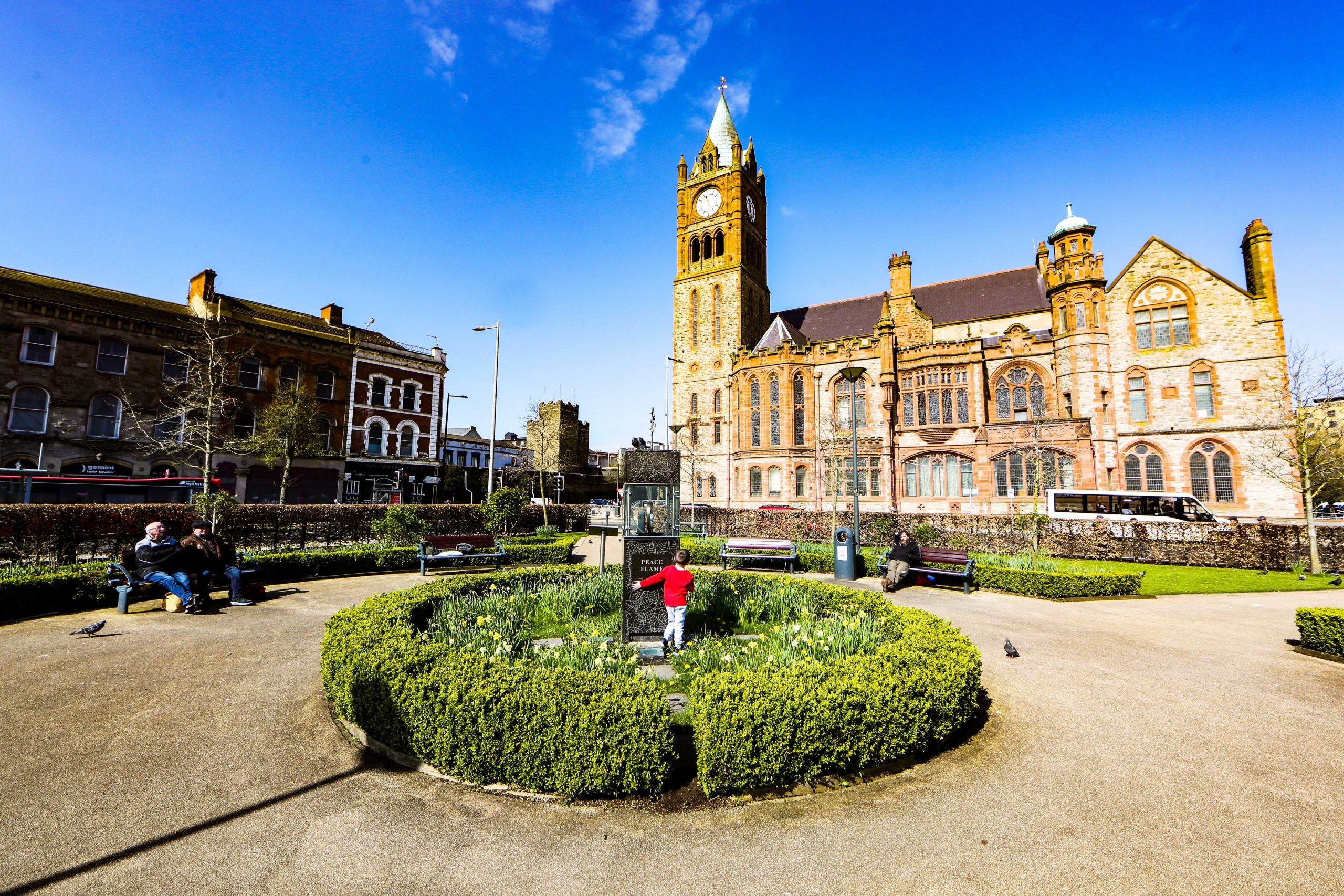
The Peace Flame
During the year-long City of Culture programme Martin Luther King III, son of the late Dr ML King Jnr, was invited to visit Derry-Londonderry and officially open the Peace Pathway and light Ireland’s first and only Peace Flame.
Marie Lindsay, former principal of St Mary’s College said of that event, “it was a remarkable day for the thousands who turned out to watch and especially for our young people. Two from every school presented a copy of their Peace Pledge to Martin Luther King III. The young people lined the route to the nearby Peace Monument to witness the lighting of the Peace Flame. The Peace Flame now stands as a powerful symbol of peace, unity and hope for the future.”
Positively encouraged by WELB Chief Executive Barry Mulholland the net for collecting Peace Pledges was spread across Northern Irelands 6 counties and into the 3 border counties. By the close of 2018, 427 schools and colleges had wonderfully written a 25-word peace pledge.
Supportively, all of Northern Ireland’s eleven Councils, along with a few notable cross-party public representatives, agreed to write a Peace Pledge
Every peace pledge was subsequently etched onto a galvanised oak leaf and incorporated into a fifteen-foot-tall galvanised oak edifice made by renowned visual artist Maurice Harron and later, very appropriately, christened the Peace Tree.
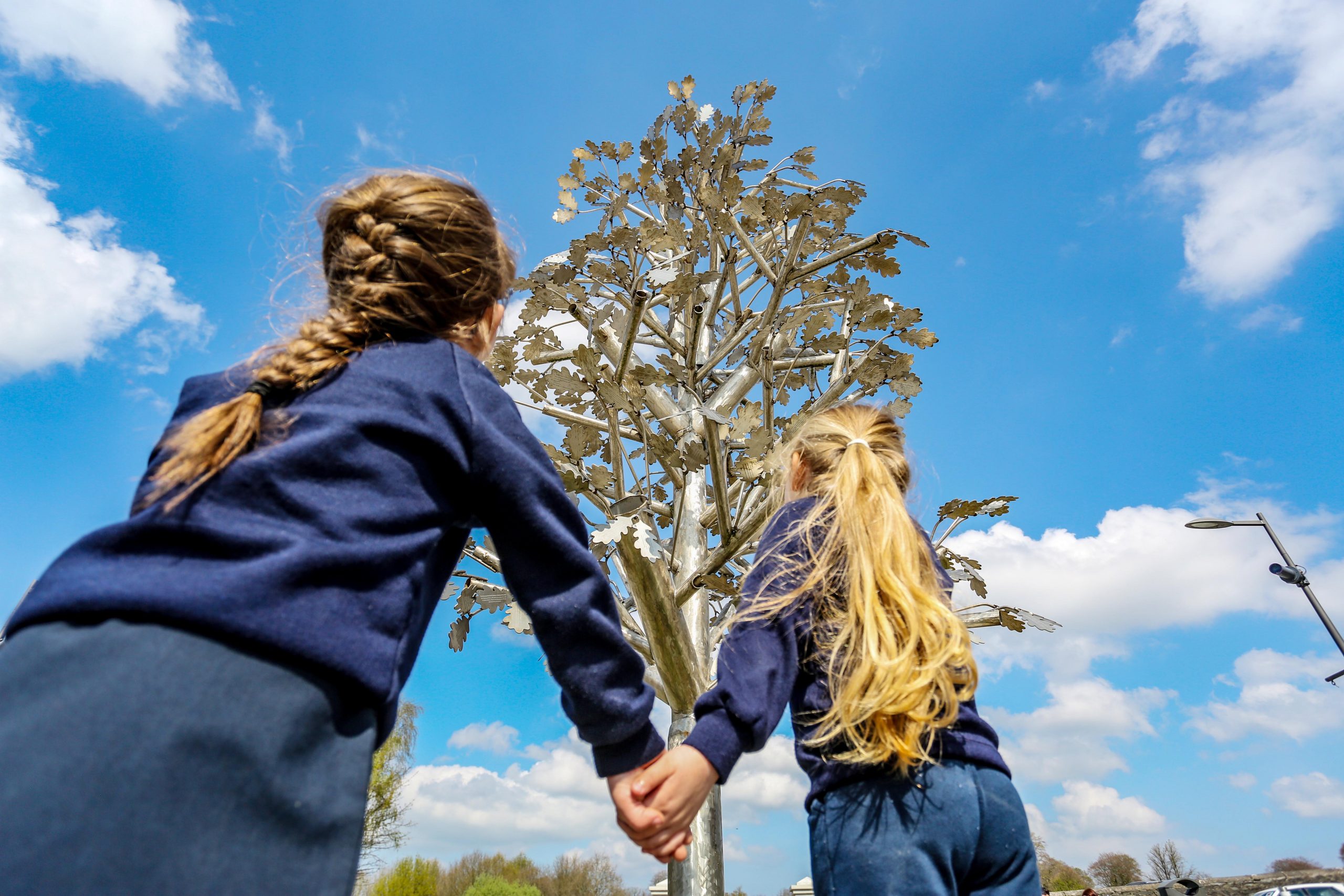
Towards the close of 2019 the Northern Ireland Office consented to the permanent installation of the Peace Tree at the new pedestrian entrance into Ebrington Square, the former British Army base!
Visitors and locals alike will, as they absorb the messages of the young both at the Peace Garden and in Ebrington Square, be encouraged to “Dream always of a peaceful, warless world” and, “To switch on and keep on the peaceful
buttons; those marked love, happiness, friendliness and tolerance.” (Robert Muller, former UN Asst Secretary General).
Terrestrial Globe
To mark the entry of Derry City and Strabane District into the Global Family of Peace Cities a stainless-steel Terrestrial Globe, designed by local architect Shane Birney and manufactured by local companies GES Abrasive Wear Plates & Clearways Derry, has been mounted onto the Peace Flame Monument. The re-configured Peace Flame Monument was officially unveiled by school pupils, in the presence of The Mayor, on 21st September 2023.
Etched onto the globe are a number of short statements written by pupils who can inspire different thinking by seeing through new lenses to further develop a culture of peace both for present and future generations.
Additionally, the favourite saying ‘Keep Er Lit’ has been inscribed around the globe. ‘Keep Er Lit’ is a positive pillar of encouragement, celebration and light-heartedness intended to make passers-by reflect and smile. The phrase refers to the flame of peace; what has been achieved already and motivation to keep the momentum going.
University Chair in Peace Studies & World-Renowned Peace Accolades
In 2011 the John Hume and Thomas P O’Neill Chair in Peace Studies was established at the Magee (Derry-Londonderry) Campus of the University of Ulster. This prestigeous Chair exists to promote the legacy of the Northern Ireland Peace Process. It moreover serves to ensure that a story of trans-Atlantic co-operation between two champions of peace remains alive for future generations.
In December 2022 a special collection of world-renowned peace accolades, awarded to the late John Hume, were presented for public display in the city’s Guildhall by the Hume family. These distinguished awards include the 1998 Nobel Peace Prize, the Martin Luther King Jnr Non-Violent Prize bestowed in 1999 and the Mahatma Gandhi Peace Prize awarded in 2001.
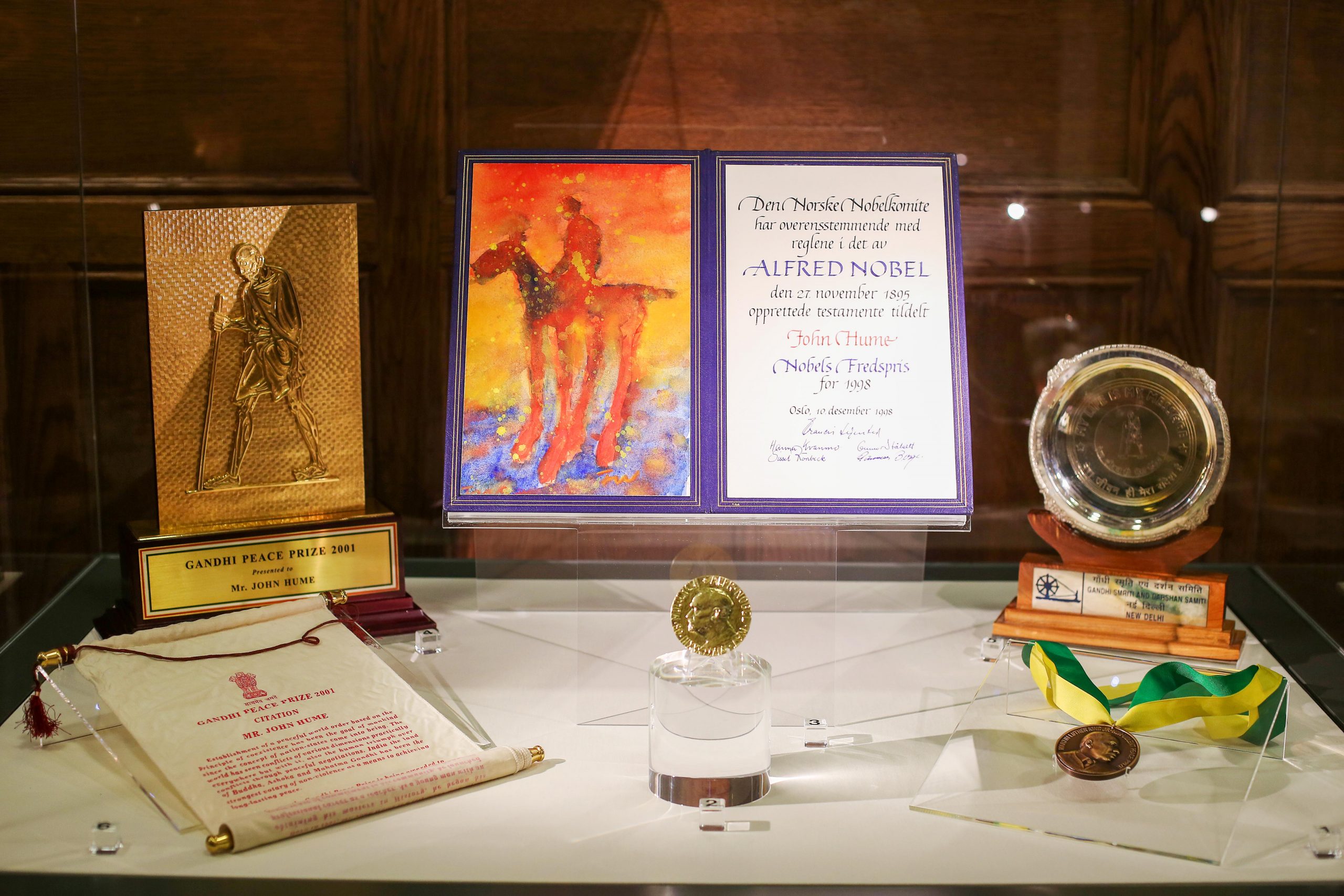
World Class City Festivals
Every year a number of world-class events take place across the City and District including -:
- The October Halloween Festival – The largest of its kind in Europe, comprising a colourful Street Carnival & spectacular Firework Display.
- The May Jazz & Big Band Festival – Regarded to be the biggest and best in Ireland for bluegrass, swing, rock & jazz
- The August Apprentice Boys of Derry Parade. One of NI’s largest parades that commemorates the relief of the city in 1689.
- The March St Patrick’s Day Parade. Impressively showcases the abundance of creative talent that exists in Derry-Londonderry.
Derry City and Strabane District can be a shop window for people in other places to see and find hope to keep moving forward and make the world a better place.
Researched and written by Reverend Dr David Latimer,
Official liaison between Derry-Londonderry and International Cities of Peace.
ABOUT THE LIAISON
DAVID LATIMER
“I was born and grew up in the small County Down town of Dromore, 20 miles south of Belfast. After leaving school I trained as a Systems Analyst with the NI Electricity Board, where I worked until I entered Theological College in 1983 to train, as a mature student, for the ministry of the Presbyterian Church in Ireland.
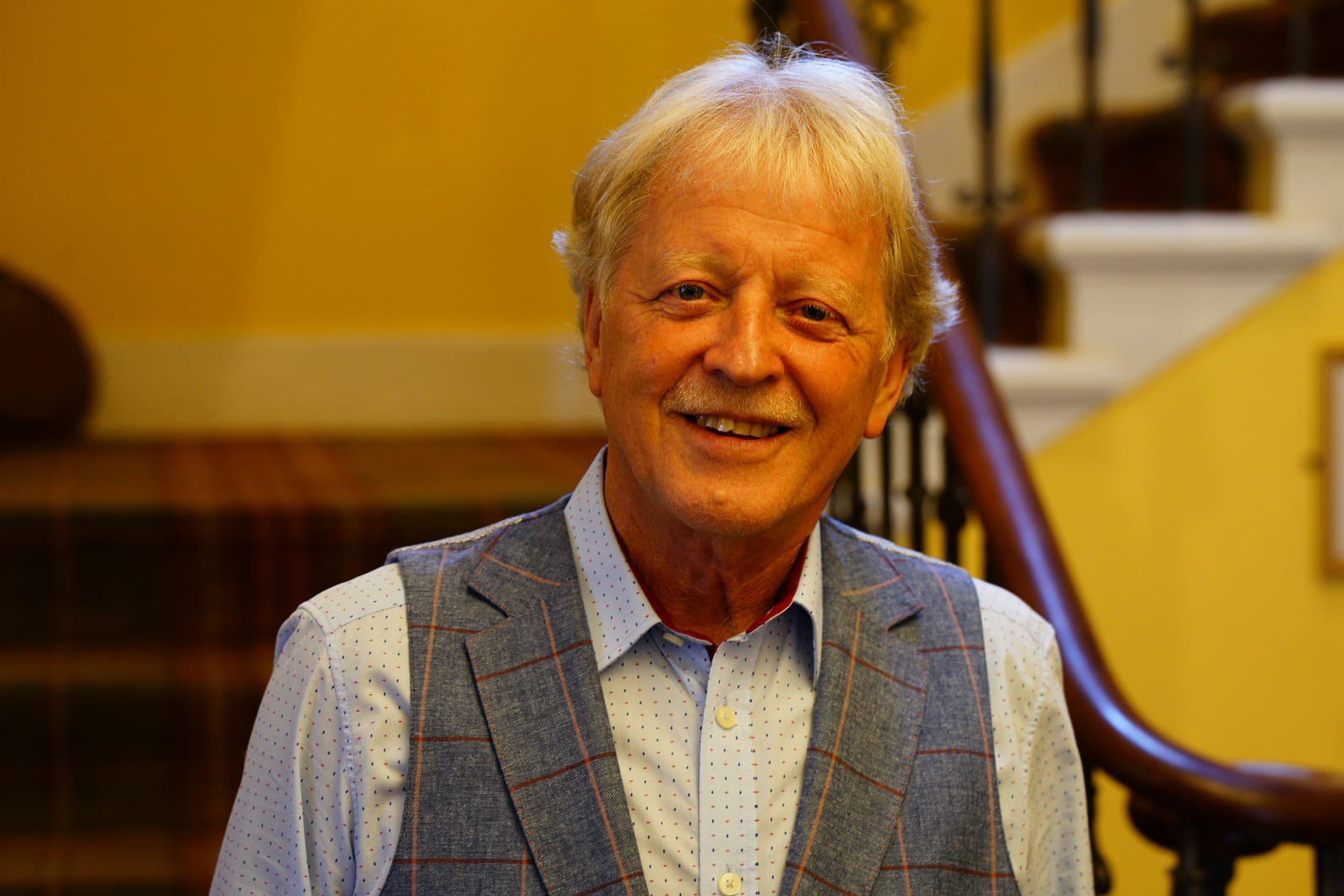
“Soon after Ordination I was appointed minister of First Derry Presbyterian church in 1988. Back then the church, vulnerably situated on the city Walls overlooking the Bogside, was enfolded in layers of security so as to protect it from bombs and bullets. Prior to my arrival the church had been partly burned by terrorists and five parishioners, all members of the security forces, had been murdered by the IRA.
“First Derry continued to be bombarded with paint bombs, long after the signing of the Good Friday Agreement in 1998. During a BBC Radio Foyle interview in 2006 I appealed, to former IRA Commander Martin McGuinness, for help. Amazingly, that not only marked the end of paint splashing onto the church; it marked the beginning of an unbelievable friendship that endured until 2017 when Martin suddenly died.
“A book entitled ‘A Leap of Faith; How Martin McGuinness and I Worked Together for Peace,’ unwraps a friendship described by President Clinton as remarkable!
“A 32 year-long-ministry in Derry-Londonderry has involved working closely with schools so as to introduce the voices of the young who, unlike adults, are not weighed down by the baggage of the past. This has progressively led to the creation of a Peace Garden and the lighting of a Peace Flame in 2013. A few years later a galvanised Peace Tree was installed at the new pedestrian entrance into Ebrington Square, the former British Army base, in 2019. This bespoke fifteen-foot-tall edifice displays 427 leaves, each embossed with an inspirational 25-word peace pledge, all written by the young growing up in Derry-Londonderry and beyond.
“In 1983 I was commissioned as an Army Reserve Chaplain and appointed to serve with 204(NI) Field Hospital RAMC(V). During the second half of 2008 I deployed to Afghanistan where I worked as Hospital Chaplain in Camp Bastion.
“In October 2021 I was awarded the “Freedom of the City of London” in recognition of promoting peace and bringing young people into the peace journey through the Peace Pledge Initiative.
“Since my retirement in 2020 I’ve started learning Irish and spending more time with Margaret my wife and our three daughters, five grandchildren and pet dog Poppy.”
Note: If information or photos used here are copyrighted, please contact us and we will immediately delete the copyrighted material.
